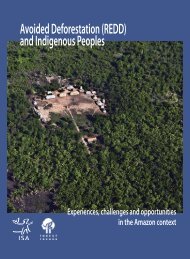BASELINE STUDY 5, Thailand - Forest Trends
BASELINE STUDY 5, Thailand - Forest Trends
BASELINE STUDY 5, Thailand - Forest Trends
You also want an ePaper? Increase the reach of your titles
YUMPU automatically turns print PDFs into web optimized ePapers that Google loves.
8.4 Civil Society<br />
Domestic NGOs<br />
<strong>Thailand</strong> has a robust civil society with many NGOs active on a plethora of domestic and regional issues. While<br />
environmental, conservation, and indigenous rights issues, among other related topics, are eagerly worked on<br />
by Thai NGOs, the forestry sector has been largely ignored since the logging ban in 1989. In the past 10 years,<br />
domestic NGOs has largely focused on the long-drawn out development and passage of the Thai Community<br />
<strong>Forest</strong>ry Bill, with a key contentious issue being the rights of communities to live within protected areas (see<br />
Box 1). Possibly as a result of this contentious process, Thai civil society appears splintered on forestry and resource<br />
management issues. Even in 2006, the ITTO noted that “from the Government’s perspective, the fragmentation<br />
of the NGO community makes dealing with them somewhat cumbersome. It would be beneficial if<br />
the dialogue on the rural people’s role in conservation strategies could be enhanced among the NGO community<br />
as the Government is getting mixed messages on how policies on forest-dependent people should be designed<br />
and implemented” ( 2006:xix).<br />
Some Thai NGOs do work on wildlife trade, however, so there is already some interest in legality of resource<br />
trade. <strong>Forest</strong>ry as related to legality and verification, sustainability, and certification is to some degree also being<br />
examined by a select number of international NGOs and funding agencies with regional offices based in<br />
Bangkok, such as IUCN, WWF, USAID, etc.<br />
Several domestic NGOS are active in conservation and the national protected areas sector, including:<br />
<strong>Thailand</strong> Environmental Institute (TEI)<br />
Dhammanaat Foundation<br />
Foundation of Education for Life and Society<br />
Seub Nakhasathien Foundation<br />
Promotion of Human Resources for Community Development Foundation<br />
Village Foundation<br />
Serving for the People Association<br />
<strong>Forest</strong> Restoration Research Unit (FORRU)<br />
In addition, there are Thai NGO groups involved in the forest-land sector more generally from a land reform<br />
perspective, including:<br />
- Land Reform Network of <strong>Thailand</strong><br />
- Northeast (Isaan) Land Reform Network<br />
International NGOs and Inter-Governmental Organizations<br />
WWF <strong>Thailand</strong> is active in the areas of wildlife trade, deforestation, overfishing, pollution, and Mekong watershed<br />
management issues. WWF have a particular area of focus on mangrove forest conservation in <strong>Thailand</strong>.<br />
IUCN <strong>Thailand</strong> has been closely involved in protected areas management in <strong>Thailand</strong>, communities and forest<br />
conservation, as well as on coastal management, biodiversity values and to some extent, sustainable timber<br />
trade flow regulation.<br />
© EU FLEGT Facility, <strong>BASELINE</strong> <strong>STUDY</strong> 5, <strong>Thailand</strong>: Overview of <strong>Forest</strong> Law Enforcement, Governance and Trade, July 2011<br />
This Action is funded by the European Union and the governments of Finland, France, Germany, the Netherlands, Spain and the UK. The views expressed herein<br />
can in no way be taken to reflect the official opinion of the European Union.<br />
www.euflegt.efi.int<br />
56
















